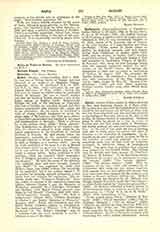

Bailey, THOMAS, controversialist, died c. 1657. He was son of Bishop Bailey of Bangor and was educated as an Anglican at Magdalen College, Cambridge, where he graduated B.A., in 1627, and M.A., in 1631. After ordination he was appointed Sub-Dean of Wells (1638). During the civil wars he retired to Oxford where he proceeded Doctor of Divinity. He was a stanch royalist and after the battle of Naseby was for a time in the king’s retinue at Raglan Castle. Subsequently through the help of the Marquess of Worcester, who was a Catholic, he travelled abroad and thus became acquainted with Catholic life, which led to his conversion. On his return he published a work of strong royalist tendencies to prove the divine right of Episcopacy; this book gave offense to Cromwell’s government and resulted in his arrest and imprisonment in Newgate. While a prisoner he wrote another book called “Herba parietis” (The Wallflower), in allusion to his captive state. After his release he retired to Italy, where he obtained employment in the household of Cardinal Ottoboni at Ferrara. He died shortly before the Restoration, probably in the cardinal’s employ, although Anthony a Wood repeats a rumor that he died at Bologna as a common soldier. Among the works published in his name is a life of Blessed John Fisher, which has given rise to some difficulty, for it was written by Dr. Richard Hall in 1559, nearly a century before. Bailey published it with additions which the martyr’s latest biographer, Rev. T. Bridgett, describes as “nothing but verbiage and blunders”. He adds that some of the additions “are palpably false and have brought discredit upon Hall”. It was suggested by Dodd that Bailey’s name was added without his knowledge by the bookseller, but if the preface signed T. B. be genuine he certainly claimed authorship, a fact which does not enhance his reputation. His authentic works are: “Certamen Religiosum” (London, 1649), an account of the conference concerning religion between Charles I and the Marquess of Worcester; answered by L’Estrange, Cartwright, and Heylyn; “The Royal Charter granted unto Kings by God Himself” (London, 1649, 1656, 1680); “Herba parietis” (London, 1650); “The End to Controversie” (Douai, 1654); “Golden Apothegms of Charles I and Henry, Marquess of Worcester” (London, 1660). Bailey also completed and published Bishop Lindsell’s edition of Theophylact. The book mentioned in Walton’s “Life of Bishop Sanderson” as “Dr. Bailey’s Challenge” may be a separate work but more probably is merely a reference to one of the above.
EDWIN BURTON

